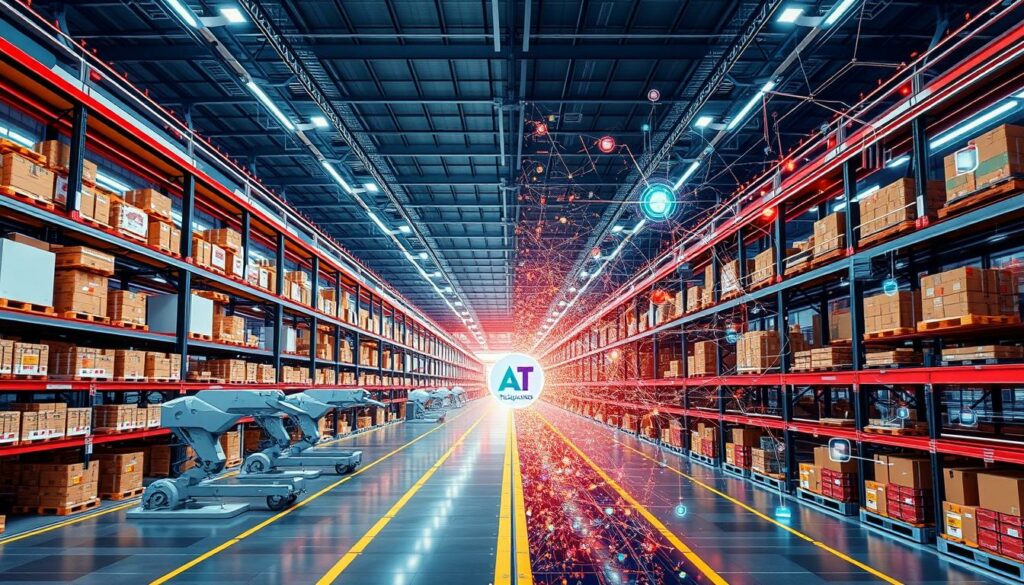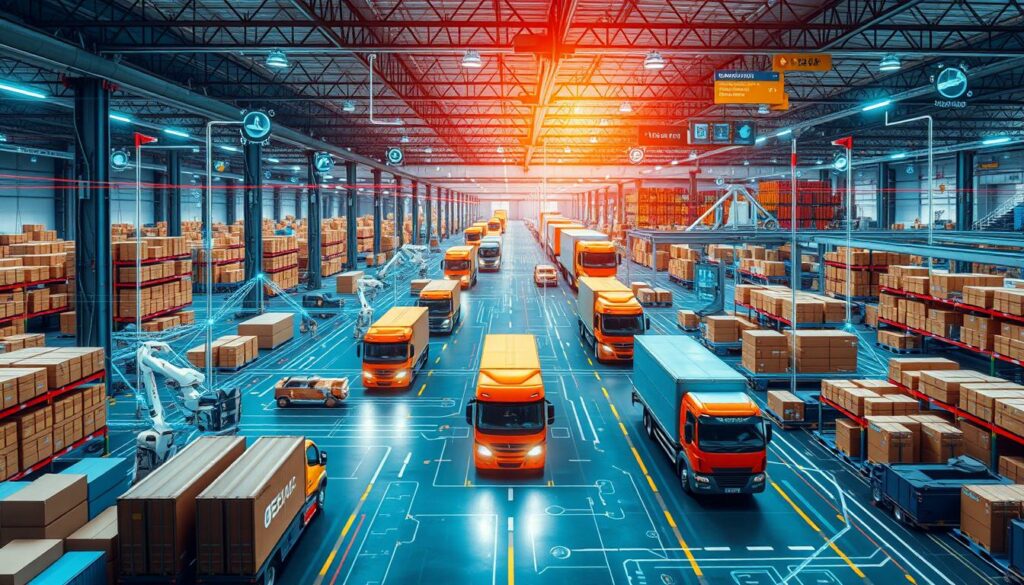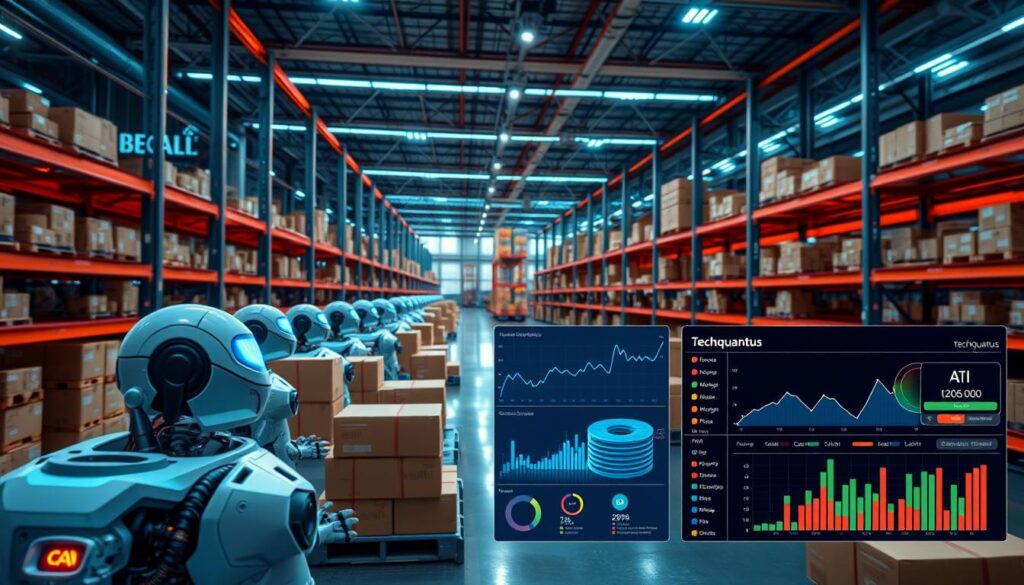Did you know that companies in the logistics industry lose billions annually due to inefficiencies? This shows how urgent it is to find new solutions for supply chain management. AI in Supply Chain offers a powerful toolset to improve supply chain optimization and logistics operations. It can analyze vast amounts of data to help you make smarter decisions, making operations more efficient and cutting costs.
With technologies like machine learning, organizations can spot patterns and make big improvements in their processes. This leads to better efficiency and cost savings.
The potential of AI to streamline operations is huge, especially in industries like mining that need more transparency and sustainability. Schneider Electric’s Materialize platform shows how AI can make a big difference. It helps the mining industry balance demand while promoting sustainable practices. For more insights, check out their approach.
As you look into the tools for using AI in your operations, you’ll see that it’s not just a trend. It’s a must for success in supply chain management.
Key Takeaways
- AI technologies provide significant cost savings through better logistics planning.
- Enhanced automation leads to improved operational efficiency and customer satisfaction.
- Machine learning enables the identification of key patterns within supply chains.
- Data analytics transforms raw data into actionable insights.
- Implementing AI can address the inefficiencies currently plaguing the logistics industry.
- Strategic AI adoption fosters a culture of innovation in organizations.
- Real-world applications demonstrate the impact of AI on modern supply chain management.
Understanding AI and Its Role in Supply Chain Management
Artificial intelligence (AI) has changed many industries, especially in supply chain management. It helps businesses make better decisions by analyzing data. With AI, companies can predict demand, manage inventory, and work more efficiently.
Definition of Artificial Intelligence
AI means making computers do tasks that usually need human smarts. This includes things like seeing pictures, understanding speech, making decisions, and translating languages. In supply chain management, machine learning makes these abilities even better by letting systems learn from lots of data.
As AI gets better, it makes operations smoother. For example, it helps predict what customers will want, helping companies plan better. It also automates inventory control, cutting down on mistakes and keeping stock levels right.
AI does more than just help with day-to-day tasks; it also helps with long-term planning. It makes supply chains stronger. Knowing how AI works in supply chains helps businesses use new solutions and solve big challenges.
The Impact of AI on Logistics Efficiency
Using AI in logistics can greatly improve efficiency. AI brings new solutions that make delivering goods faster and cheaper. It also makes services better.
With real-time tracking and smart route planning, companies can quickly adapt to changes. This cuts down on delays and makes customers happier.
Enhancements in Delivery Operations
AI has changed how we handle deliveries. For example, Pošta Slovenije and FarEye teamed up to use AI in logistics. FarEye’s system works well with current systems, causing little disruption but making a big difference.
This partnership helps postal services save up to 20% by optimizing routes. The new mobile app cuts down on mistakes and keeps customers updated on their deliveries.
AI also helps with being more eco-friendly. The European Union wants to cut down on greenhouse gas emissions by 2030. Using AI can help by using resources better and cutting down on emissions. As more industries use AI, focusing on being green in logistics becomes more important.
AI helps with all kinds of shipments, from letters to big logistics jobs. Companies see that AI not only makes logistics better but also helps with being more sustainable. This makes AI a key part of modern business strategies.
Key Technologies in AI for Supply Chain Optimization
Businesses are turning to AI to improve their supply chains. Machine learning and deep learning are key to this effort. They help analyze data, predict trends, and make smart choices.
Machine Learning and Deep Learning
Machine learning is the base for predictive analytics in supply chains. It lets companies handle huge amounts of data. The more data it gets, the better it predicts trends and spots patterns. This helps in managing inventory better and making the whole process more efficient.
Deep learning is a part of machine learning that uses complex neural networks. It’s great for tasks like recognizing images and speech. This tech helps automate many parts of the supply chain. For example, it can improve how companies talk to customers or check product quality.
The table below shows how machine learning and deep learning differ and what they’re used for in supply chain optimization:
| Technology | Description | Applications |
|---|---|---|
| Machine Learning | Analyzes data and improves with more data processing. | Predictive maintenance, inventory forecasting. |
| Deep Learning | Utilizes neural networks to achieve high accuracy in data interpretation. | Image and speech recognition, automated content creation. |
Using these technologies makes your supply chain run smoothly and efficiently. It opens the door to new solutions in logistics and delivery.
AI in Supply Chain: Benefits and Challenges
Using AI in Supply Chain management brings many benefits. It makes operations more efficient and cuts costs. By using machine learning, businesses can forecast demand more accurately. This leads to better inventory management and logistics, key for a strong supply chain.
Advantages of AI Implementation
AI makes many processes more efficient. It looks at huge amounts of data to spot patterns and predict demand. This is key for businesses that want to meet customer needs fast. It also means less waste and big cost savings.
But, there are challenges with AI too. Companies worry about data privacy and fitting AI with old systems. They need skilled people to overcome these hurdles. Finding the right talent can be hard, slowing down the process.
Thinking about the ethics of AI is also important. AI must support business goals and be clear to everyone. Knowing the good and bad sides of AI in Supply Chain helps make better choices.

| Benefit | Description |
|---|---|
| Improved Demand Forecasting | Enhanced accuracy in predicting customer demand leading to optimized inventory management. |
| Efficiency | Streamlined processes through data analysis, reducing resource wastage. |
| Cost Reduction | Lower operational costs through better resource allocation and reduced inventory surplus. |
| Data-Driven Insights | Able to make informed decisions based on comprehensive data analysis. |
Adding AI to Supply Chain offers big chances for growth. But, it’s important to handle its challenges well for success. Looking at resources like AI and its impact on productivity can help understand this new tech better.
Implementing AI-Driven Decision Making
Adding AI-driven decision making to your company needs a careful plan. Starting this journey means taking a few important steps. These steps prepare you for using AI well. Knowing what your company needs helps see where AI can make a big difference. Talking to everyone early makes sure everyone is on board.
Steps for Effective Implementation
- Identify Objectives: Clearly outline what you aim to achieve with AI integration, such as better forecasting or improved operational efficiency.
- Conduct a Needs Assessment: Analyze current processes and determine where AI can enhance decision-making capabilities.
- Involve Stakeholders: Engage employees and management to gather insights and foster a supportive culture for change.
- Develop a Roadmap: Create a detailed plan outlining timelines, responsibilities, and resources required for implementation.
- Invest in Training: Provide continuous training and support to ensure that employees can use AI tools effectively.
- Monitor Progress: Regularly assess the outcomes of AI initiatives and adjust strategies as necessary to keep up with evolving needs.
By following these steps, companies can use AI to make better decisions. When putting these strategies into action, look at how other companies have done it successfully. For example, see this analysis of AI’s impact on e-commerce. The growth of AI shows how important it is to make smart, timely decisions in today’s fast-changing market.
Use Cases of AI in Supply Chain
Artificial intelligence is changing how we manage supply chains with new tech. Companies use AI to make things more efficient and sustainable. These examples show how AI helps different industries.
Real-World Applications
Johnson & Johnson uses AI to make logistics better. It helps products get to their destinations faster. By automating inventory and delivery schedules, they work better.
Schneider Electric made the Materialize platform. It tracks emissions in mining to make supply chains greener. This shows how AI can help us be more sustainable.
The market for generative AI was worth US$ 29.00 billion in 2022. It’s expected to grow to $667.96 billion by 2030. North America leads the market, making up about 49.93% of it. Generative AI in logistics will change how we work in the next few years.
Many companies show how AI can solve different problems. Here’s a table with examples of AI in supply chains and their benefits:
| Company | AI Application | Key Benefit |
|---|---|---|
| Johnson & Johnson | Logistics Optimization | Improved delivery efficiency |
| Schneider Electric | Materialize Platform | Emissions tracking for sustainability |
| Amazon | Automated Warehousing | Enhanced inventory management |
| Walmart | Predictive Analytics | Improved demand forecasting |

Generative AI is changing supply chains for the better. It brings new levels of efficiency and sustainability. Embracing these technologies can give companies a big edge. For more on generative AI in logistics, check out this link.
AI-Enhanced Data Analytics for Better Insights
In today’s fast-paced supply chain world, AI-enhanced data analytics changes how we collect and understand information. It helps supply chain managers get insights that make operations better. AI in Supply Chain management tackles issues like data collection, analysis, and visualization. This prepares businesses to adapt to market changes and meet customer needs.
Importance of Data Analytics in Supply Chain
Data analytics is key to making supply chains run smoothly. Here are some main benefits:
- Trend Prediction: Machine learning models get better with more data, making them great for predicting trends and spotting important patterns.
- Enhanced Accuracy: Deep learning uses complex neural networks for high accuracy in tasks, like demand forecasting.
- Automated Insights: AI tech makes automated content and real-time analytics possible, making decisions faster.
- Data-Driven Strategies: AI-powered fraud detection systems improve over time, giving businesses peace of mind.
- Performance Monitoring: Regular checks and real-time watching are key to keeping AI systems running well.
Using these strategies helps businesses stay ahead, manage inventory better, and make customers happier. The power of data analytics, with AI in Supply Chain, can greatly boost business growth and make operations better.
| AI Application | Description | Benefit |
|---|---|---|
| Machine Learning | Models analyze historical data to forecast future trends. | Improved accuracy in demand predictions. |
| Deep Learning | Uses multi-layered neural networks for complex data analysis. | High precision in recognizing patterns within large data sets. |
| Automated Insights | Generates reports and analysis with minimal human intervention. | Speeds up decision-making processes. |
| Fraud Detection | Uses AI to identify and mitigate fraudulent activities. | Increased security and reduced risks. |
| Real-Time Monitoring | Employs continuous surveillance of AI systems. | Ensures operational efficiency and effectiveness. |
Real-World Examples of AI in Supply Chain Management
Businesses are looking for ways to make their operations smoother. Industry case studies show how AI is changing supply chains. These examples show how AI helps businesses work better and brings big benefits.
Case Studies
Pošta Slovenije and FarEye teamed up to use AI in logistics. They made tracking parcels better and got customers more involved. Thanks to this, Pošta Slovenije has gotten much better at delivering things.
The results are impressive. Using AI has led to:
- Cost savings: Big cuts in what it costs to run things.
- Improved delivery times: Packages get sent out and arrive quicker.
- Higher customer satisfaction rates: People are happier with how reliable and clear the delivery is.
AI in supply chains is always getting better. Extended Reality (XR), which includes AR, VR, and MR, is a big area to watch. Even though XR headset sales went down in 2022 and 2023, they’re expected to jump by over 40% in 2024. New products like the Apple Vision Pro are making a big difference. XR is being used in logistics to help with things like guiding workers in warehouses, showing its potential.
These examples show how important it is for logistics to be flexible. As you see these trends, think about how your company could use similar tech.
If you’re interested in XR in logistics, check out this resource. It talks about different innovations that can make supply chains work better.
Conclusion
AI is changing the game in Supply Chain management. It makes operations more efficient, accurate, and helps in making better decisions. By using AI, businesses can improve their processes, quickly adapt to market changes, and give customers a better experience.
Companies that use AI tools are better equipped to handle the complex world of logistics. They stay ahead in the competition. AI brings many benefits, like better data analysis and automated inventory management.
Embracing AI helps solve current problems and prepares for future changes in logistics. By using strong AI strategies, like centralizing product data with PIM systems, your business can grow and succeed.
AI is changing how we run businesses. It’s key for long-term success. AI helps in optimizing operations, cutting costs, and improving customer engagement. Stay ahead, keep innovating, and use AI to excel in the competitive market.
FAQ
What is artificial intelligence in the context of supply chain management?
Artificial intelligence (AI) in supply chain management uses advanced tech to analyze big datasets. It automates processes and makes smart decisions. This leads to better demand forecasting, inventory management, and boosts overall supply chain performance.
How does AI improve logistics efficiency?
AI makes logistics better by tracking in real-time, optimizing routes, and managing resources. With AI tools, companies can make delivery operations smoother, cut costs, and boost customer satisfaction.
What technologies underpin AI applications in supply chain optimization?
Machine learning and deep learning are key technologies for AI in supply chain optimization. They do predictive analytics, make decisions, and learn from big datasets. This helps spot patterns, lowers risks, and improves processes.
What are the benefits of implementing AI in supply chain management?
Using AI in supply chain management boosts demand forecasting accuracy, efficiency, and cuts costs. But, businesses might face challenges like integrating AI, data privacy issues, and needing skilled staff.
What steps should organizations take to implement AI in decision-making processes?
First, assess your needs, talk to stakeholders, and create a roadmap for AI. Keep training and supporting your team to use AI for quick, data-driven decisions. This will improve your operations.
Can you provide examples of real-world applications of AI in supply chain management?
Yes, take Johnson & Johnson using AI to make logistics smoother and Schneider Electric’s Materialize platform for tracking emissions. These examples show how AI tackles efficiency and sustainability in different industries.
How does AI enhance data analytics in supply chains?
AI boosts data analytics by improving data collection, analysis, and visualization. This gives actionable insights for supply chain strategies. It helps companies understand market trends, customer habits, and where they can improve.
What are some ethical considerations when implementing AI in supply chain management?
Companies should focus on ethical use of AI by making sure it meets their goals and follows data privacy laws. It’s important to be open about AI processes and have skilled people to handle ethical issues.
How can AI applications contribute to supply chain sustainability?
AI helps supply chain sustainability by using resources wisely, improving efficiency, and cutting waste with predictive analytics. This reduces operational costs and supports the environment by tracking and lowering emissions.
Source Links
- https://www.logisticsbusiness.com/transport-distribution/last-mile-delivery/elevate-parcel-delivery-with-advanced-routing-capabilities/
- https://www.antiersolutions.com/smart-contract-attacks-and-protections-the-importance-of-a-smart-contract-audit/
- https://medium.com/@danielcfng/harnessing-ai-for-smb-growth-insights-from-dr-timothy-low-on-transforming-healthcare-and-beyond-5b4a0230851c
- https://workplaceinsight.net/generative-ai-will-lead-to-a-threefold-increase-in-greenhouse-gases-from-data-centres/
- https://www.insidermonkey.com/blog/c3-ai-inc-ai-redditors-are-bullish-on-this-ai-stock-1348249/
- https://www.bain.com/insights/ai-and-sustainability-power-of-integration-ceo-sustainablity-guide-2024/
- https://www.bain.com/insights/how-ceos-turn-decarbonization-setbacks-into-progress-ceo-sustainability-guide-2024/
- https://medium.com/@zybie68/the-ultimate-guide-to-artificial-intelligence-what-you-need-to-know-for-the-future-371f5ac49ea3
- https://www.newstatesman.com/spotlight/economic-growth/2024/09/digital-trade-economic-growth-inclusive-charteredinstituteofexportandtrade
- https://www.aviationbusinessnews.com/mro/mro-interviews-comments-articles/monitoring-aftermarket-movements/
- https://www.prweb.com/releases/wine2wine-business-forum-announces-keynote-speakers-for-302240273.html
- https://www.cnbc.com/2024/09/09/foreign-election-influence-campaigns-have-bark-but-questionable-bite.html
- https://www.dhl.com/ar-en/home/innovation-in-logistics/logistics-trend-radar/gen-ai.html
- https://www.biospace.com/press-releases/roche-advances-ai-driven-cancer-diagnostics-by-expanding-its-digital-pathology-open-environment
- https://www.dhl.com/mx-en/home/innovation-in-logistics/logistics-trend-radar/augmented-and-extended-reality.html
- https://bmmagazine.co.uk/tech/ai-in-ios-6-things-you-can-do-with-ai-on-your-iphone-or-ipad/
- https://techbullion.com/how-innovative-product-information-management-solutions-can-transform-your-e-commerce-strategy/
- Budgeting and Cost Control for IT Projects: My Expert Advice
- Learn How to Manage IT Projects Effectively with My Advice
- I Share My Best Data Backup Strategies Using Cloud Storage
- I Learned About AI Mistakes That Could Change Your Life
- Sustainable & Green Energy Solutions for Next‑Gen Data Centers Trend Report
Related posts:
 How AI is Revolutionizing the E-commerce Industry
How AI is Revolutionizing the E-commerce Industry
 The Role of Quantum Computing in Drug Discovery
The Role of Quantum Computing in Drug Discovery
 How to Ensure Data Privacy Compliance in 2024
How to Ensure Data Privacy Compliance in 2024
 How to Use Digital Twins for Predictive Maintenance in 2024
How to Use Digital Twins for Predictive Maintenance in 2024
 How to Implement Robotics for Business Process Automation
How to Implement Robotics for Business Process Automation
 Why Next-Generation Firewalls Are Critical for Modern Enterprises
Why Next-Generation Firewalls Are Critical for Modern Enterprises
